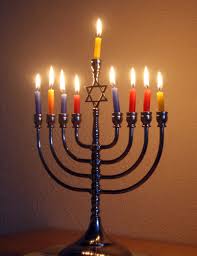|
by Rabbi Katy Z. Allen Blessed is all that is sacred and holy in this universe, which has kept us moving forward, sustained us in every way, and brought us to this day, still alive and kicking.
Such is the essence and spirit of the Shehecheyanu, the prayer we say at every holiday and special occasion, including Hanukkah, what some call the Jewish gratitude prayer. Gratitude. It’s a wonderful, beautiful word. Associated with an emotion that can be transformational for us personally, toward the good. I seem to have had a need to focus on gratitude lately, and one of the ways that has expressed itself is that I’ve been teaching about gratitude. Having the concept constantly on my mind has opened new windows into my own feelings of gratitude, especially in one particular aspect of my life. Nine years ago this month at LimmudBoston, Elie Gerzon and I succeeded in gathering together a Jewish cohort concerned about climate change, a cohesive enough group to begin the process that led to the creation of JCAN, the Jewish Climate Action Network. At the time, I was immensely grateful for that breakthrough, especially because a couple of years earlier, I had also tried, and my efforts had fizzled - nothing had taken shape. Nine years ago, climate change was less blatantly the incremental disaster that it more obviously is today, and the national Jewish climate action landscape was almost barren, save for a few important voices. Little serious effort was being made within the Jeiwsh community to respond to the growing threat of climate change. Personally, I needed to be doing something, anything, about climate change, but I also needed to be doing the work rooted in Jewish tradition. And so I stretched myself, and co-created and, for eight years led, an activist organization. I had never been an activist and could never have anticipated such a move on my part. I was totally outside my comfort zone. I was a chaplain and saw the work I was doing as eco-chaplaincy, a previously non-existent field that only a few people were beginning to speak about or practice. I considered my work founding and running JCAN to be chaplaincy work: I was creating and holding a space for others to engage in climate action through a Jewish lens, an opportunity that filled a previously empty niche. In those early years as the leader of a Jewish climate action organization and a rabbi, my name often came up when someone in the Boston area wanted a Jewish presence at an interfaith climate action event. Need a speaker at a rally? Need a Jewish representative to plan a climate action? Need a Jewish panelist at an event? A Jewish voice for an interfaith group testifying at the statehouse? Ask Rabbi Katy. I was glad to do this work, and more. It was meaningful, it stretched me, and it provided a Jewish voice in the faith climate world. But I also longed to not be so alone. I wasn’t the only Jewish leader in Greater Boston to be involved, but the options were definitely limited. I longed to be part of a team, and to know that I could more readily turn to a colleague to hold some of the spiritual leadership. With time, other voices began to enter the fray, relieving some of the sense of responsibility from my shoulders. But also, with each passing season, the climate crisis grew more obvious. One-by-one, then two-by-two and three-by-three, other Jewish leaders entered the field, many of them new and young professionals, but some of them older and more experienced. And then suddenly, over a short couple of years, the national Jewish climate action landscape exploded, and the situation drastically changed. The Shalom Center had long been doing climate work, but now the Big Bold Jewish Climate Fest hit the scene. Dayenu came into being. Hazon took a bold national stand. Small organizations popped up around the country. I was not alone. I was suddenly a small player in an amazing and diverse sea of Jewish climate activists. And I was delighted. The relief I felt was palpable, at the same time that it was mixed with a certainty that we are in the midst of a growing catastrophe. I find it ironic that as the climate situation worsens, I am feeling incredibly grateful. I am grateful that I don’t have to hold the space with so few others. There are dozens and dozens of rabbis and cantors and Jewish educators, laypeople and unaffiliated folks and students and even children, from every walk of life, who are leading the charge in the Jewish community to act in the face of this incomprehensible and existential threat to the world as we knew it. I am relieved, and I am grateful. And as I kindle the lights of the hanukkiah this Hanukkah, I think about the miracle of the single cruse of oil that lasted for eight nights, and I see its meaning expressed in my experience. It is through community, through holding each other through hard times, through gathering together to do the work of justice and compassion that each of us, a single cruse of oil, can last beyond one dark night. Together, we can do what none of us can do alone. And so we say, Shehecheyanu!
0 Comments
|


 RSS Feed
RSS Feed